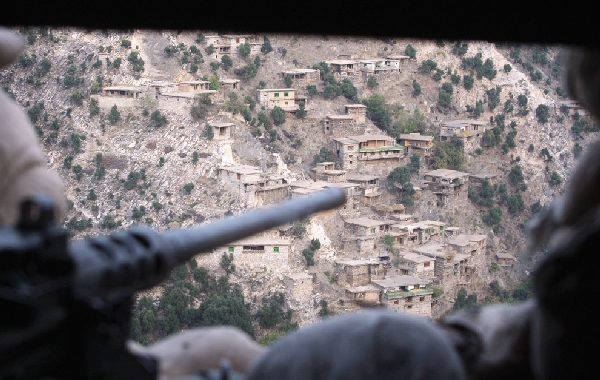Last gunmen killed in India, ending siege
By Emily Wax and Rama Lakshmi, Washington Post, November 29, 2008
Security forces brought a three-day assault on India’s financial and cultural capital to an end Saturday morning, killing the last remaining gunmen holed up in one of the city’s luxury hotels after freeing hostages and recovering bodies from two hotels and a Jewish center Friday.
Pakistani officials, responding to charges by Indian leaders that the attack was carried out by an organization with ties to Pakistan, said a senior intelligence officer would travel to India, in an apparent attempt to ease tensions between the two nuclear-armed states.
Indian officials said they now believe that at least 15 gunmen carried out the operation after reaching Mumbai by sea. After an interrogation of one of the attackers, Indian intelligence officials said they suspected that a Pakistani Islamist group, Lashkar-i-Taiba, was responsible. An Indian intelligence document from 2006 obtained by The Washington Post said members of the group had been trained in maritime assault. [continued…]
‘I saw them land on the jetty’
Times of India, November 28, 2008
“In the darkness, I saw eight young men stepping out of the raft, two at a time. They jumped into the waters, and picked up a haversack. They bent down again, and came up carrying two more haversacks, one in each hand,” said Tamore. The bags, he thought, looked very heavy.
They were in their 20s, fair-skinned and tall, clad in jeans and jackets. “The man who was lying down shouted at them, asking what they were doing there. So one of them shouted back ‘Tussle mut le ‘. When they approached me, I also asked them who they were, and what were they doing there. One of them said ‘student hai’.”
Tamore said he found their presence unusual, but as they said they were students, and were carrying haversacks, he didn’t think much about it. He thought they were youngsters returning from a picnic. [continued…]
Mumbai police declare Taj Mahal hotel siege over
By Sadie Gray, The Guardian, November 29, 2008
The militants may have reconnoitred the hotels by checking in as guests, Indian newspaper reports said today. They appeared to be well trained and “very, very familiar” with the layout of the hotel, an army general said.
“At times we found them matching us in combat and movement. They were either army regulars or have done a long stint of commando training,” a commando told the Hindustan Times.
A bag found in the Taj Mahal hotel contained 400 rounds of ammunition, grenades, identity cards, rations, $1,000 (£650) in cash and international credit cards, indicating a meticulously planned operation. [continued…]
U.S. intelligence focuses on Pakistani group
By Mark Mazzetti and Salman Masood, New York Times, November 29, 2008
American intelligence and counterterrorism officials said Friday that there was mounting evidence that a Pakistani militant group based in Kashmir, most likely Lashkar-e-Taiba, was responsible for this week’s deadly attacks in Mumbai.
The officials cautioned that they had reached no firm conclusions about who was responsible for the attacks, or how they were planned and carried out. Nevertheless, they said that evidence gathered in the past two days pointed to a role for Lashkar-e-Taiba or possibly another group based in Kashmir, Jaish-e-Muhammad, which also has a track record of attacks against India.
The officials requested anonymity in describing their current thinking and declined to discuss specifics of the intelligence that they said pointed to Kashmiri militants. In the past, the American and Indian intelligence services have used communications intercepts to tie Kashmiri militants to terrorist strikes. Indian officials may also be gleaning information from at least one captured gunman who participated in the Mumbai attacks.
According to one Indian intelligence official, during the siege the militants have been using non-Indian cellphones and receiving calls from outside the country, evidence that in part led Indian officials to speak publicly about the militants’ external ties. [continued…]
Pakistani militants at center of probe
By Craig Whitlock and Karen DeYoung, Washington Post, November 29, 2008
Evidence collected by police in Mumbai, along with intelligence gathered by U.S. and British officials, has led investigators to concentrate their focus on Islamist militants in Pakistan who have long sought to spark a war over the disputed province of Kashmir. India and Pakistan have already fought two wars over Kashmir, the battleground between Hindu-majority India and Muslim-majority Pakistan that each country claimed soon after India’s partition in 1947.
A U.S. counterterrorism official said additional evidence has emerged in the past 24 hours that points toward a Kashmiri connection. “Some of what has been learned so far does fall in that direction,” the official said, declining to offer specifics.
“We have to be careful here,” said the official, speaking on the condition of anonymity. “When you posit a Kashmiri connection, that puts Pakistan on the table. That is huge, enormous, but what does it mean? It can be anything from people who were [initially] in Pakistan, to maybe people who used to be associated with someone in the Pakistani government, to any gradation you could find.” [continued…]
Britons are among those detained, official claims
By Michael Evans and Jeremy Page, The Times, November 29, 2008
Britons were among the militants arrested for the Bombay attacks, a senior Indian official said yesterday.
Vilasrao Deshmukh, the chief minister of Maharashtra state, in which Bombay lies, made the claim on an Indian television station.
Patrick Mercer, MP, a former Conservative security spokesman, told The Times that he had been given information that at least two of the terrorists had credit cards and other identifying documents that linked them to Dewsbury, West Yorkshire. Other reports last night claimed that men from Leeds and Bradford were among the terrorists. [continued…]

